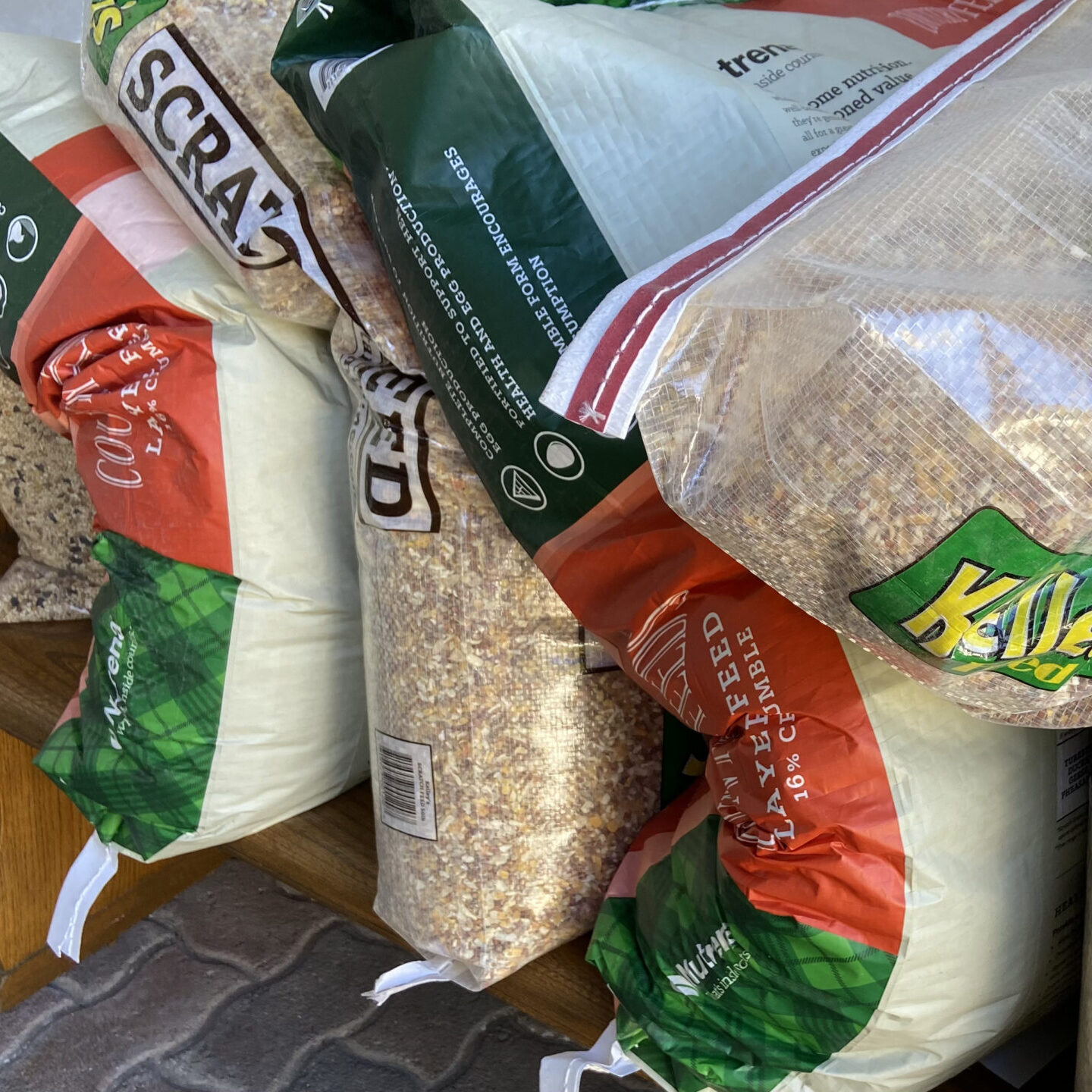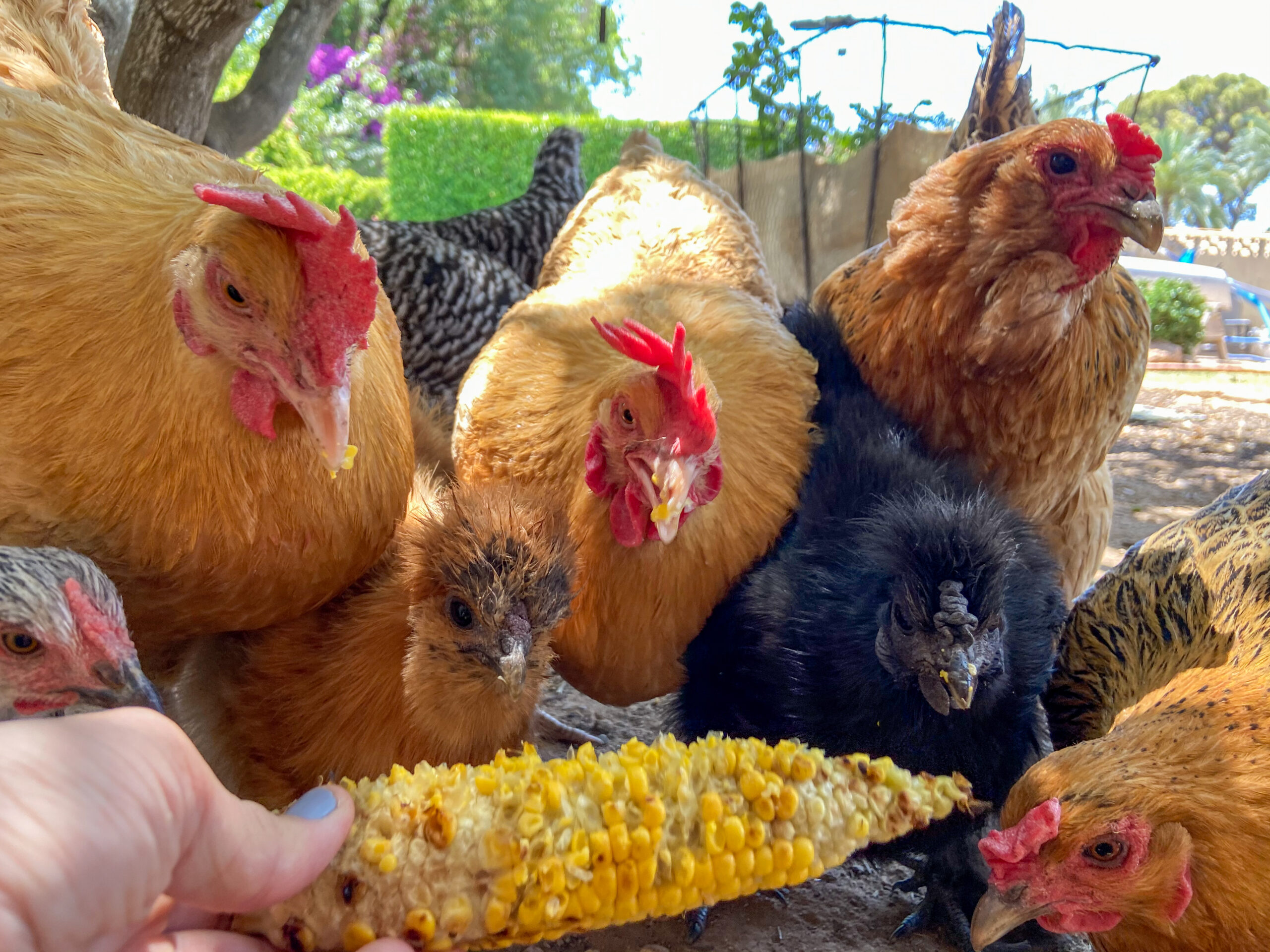What Chickens Eat
Typically, backyard and commercial chickens will eat a specially formulated crumble or pellet found at your local feed store. Chickens eat about 1/3 cup of crumble a day and can have up to an additional 10% of their diet in treats (just over 5 tablespoons).
On this page you will find:
How to formulate homemade chicken feed
Treats chickens can and can't have
Ways to improve your chicken's diet
Nutrients chickens need to live

See our downloadable guide for the most detailed information about what chickens love to eat and how chickens can gain the below essential nutrients. We also include suggested feeding amounts to get you started!
Whether you are new to keeping chickens or have raised them for years, considering what you are feeding your flock is a good habit to practice. We constantly consult guides for what we can and cannot feed our chickens (because who can remember all of that!), from table scraps to backyard plants around the coop. It is always a good idea to be informed about the dangers or benefits of what your chickens are exposed to.
Chickens, like any other living thing, have certain nutritional requirements to live a healthy life.
Are you looking for even more ways to increase your chickens’ health?
Basic requirements for chicken nutrition include:
Fresh water
All living things need fresh water to maintain healthy body function and metabolism.
Carbohydrates
Provides “quick” energy to the birds throughout the day.
Protein
Protein is important for muscle and tissue building and repair.
Calcium
Strengthens bones and eggshells.
Fats and Oils
Provides long term energy the birds can burn off throughout the day and keeps feathers and skin healthy.
Vitamin A
Needed for normal growth, disease resistance, vision, and reproductive health.
Vitamin B Complex
Needed to maintain optimum growth rate and reproductive health.
Vitamin D
Healthy growth, prevention of rickets, strengthens eggshells.
Vitamin K
Improves circulation and keeps blood healthy.
Phosphorous
Strengthens bones and eggshells.
Zinc
Needed for healthy skin and feather development.
Manganese
Strengthens eggshells and creates a good hatching rate.
Iodine
Control of metabolism
Treats Chickens Can Eat
Treats should be fed to chickens in moderation and consist of only about 10% of their total diet.
Daily Feed = 1/3-1/2 cup (5.3-8 Tablespoons)
Daily Treat = 10% = between 5.3/10 and 8/10 Tablespoon
Treats Chickens Can Eat
Apples/Pears (without seeds)
Bananas
Beans (cooked)
Berries
Breads
Bugs (Black Soldier Fly Larvae, Mealworms, Crickets)
Broccoli and Cauliflower
Cabbage and Brussels Sprouts
Carrots (especially leaves!)
Cereal (no sugar)
Corn
Cucumbers
Eggs (thoroughly cooked)
Flowers (untreated with pesticides and no bulb flowers)
Fruit (no pits)
Grains
Grapes/Raisins
Leafy Greens (Lettuce, Broccoli leaves, Kale)
Melons
Oatmeal
Pasta (cooked)
Peppers
Pomegranites
Plain Popcorn
Squash
Scratch
Sprouts
Sunflower Seeds
Sweet Potato
Tomatoes (nothing green on the plant though)
Yogurt
Treats Chickens Can’t Eat and Why
Apple/Pear Seeds
Contains trace amounts of cyanide.
Anything Really Salty
Can cause salt poisoning in small bodies such as chickens.
Avocado
Skin and pit have low levels of toxicity. Fruit contains Persin, which is potentially fatal.
Butter
Too fatty for chickens.
Citrus
Can cause salt poisoning in small bodies such as chickens.
Coffee/Coffee Grounds
Caffeine is not good for chickens.
Dried/Undercooked Beans
Raw, or dry beans, contain a poison called hemagglutinin which is toxic to birds.
Eggplant Fruit/Leaves
Contains solanine that can cause gastrointestinal and neurological disorders.
Green Tomato and Leaves
Contains solanine that can cause gastrointestinal and neurological disorders.
Onion
Can flavor eggs in small quantities and can cause anemia in larger quantities. Best to stay away from it.
Raw Eggs
You don’t want to introduce your chickens to the tastiness of eggs which may be waiting to be collected in the nest boxes.
Raw Green Potato Peels/Leaves
Contains solanine that can cause gastrointestinal and neurological disorders.
Rhubarb and Leaves
NOPE. Can contain oxalic acid which is harmful to the birds.
Sugar
Sugar is not good for birds.
Treats Chickens Can’t Eat
These foods can make your chicken VERY sick, so it is best to avoid them.

